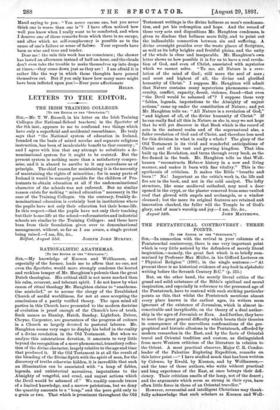RATIONALISTIC ANATHEMAS.
[TO THE EDITOR OF THE " SPECTATOR ."f SIR,—My knowledge of Kuenen and Wellhausen, and especially of the former, leads me to affirm that no one, not even the Spectator, would more strongly condemn the heated and reckless temper of Mr. Haughton's polemic than the great Dutch theologian. His critical skill is not more marked than his calm, reverent, and tolerant spirit. I do not know by what canon of ritual theology Mr. Haughton claims to " anathema- tise misbelief," or to accuse the clergy of the Established Church of sordid worldliness, for not at once accepting the conclusions of a partly verified theory. The open mind all parties in this Church have presented to the modern doctrine of evolution is proof enough of the Church's love of truth. Such names as Stanley, Hatch, Sunday, Lightfoot, Driver, Cheyne, Carpenter, are guarantees of the progress of culture in a Church so largely devoted to pastoral labours. Mr. Haughton seems very eager to display his belief in the reality of a divine revelation in the Old Testament. But when we analyse this ostentatious devotion, it amounts to very little beyond the recognition of a mere phenomenal, transitory reflec- tion of the divine character, largely relative to the age and time that produced it. If the Old Testament is at all the result of the blending of the Divine Spirit with the spirit. of man, for the discovery of truths otherwise hidden, it is incredible that such an illumination can be associated with " a heap of fables, legends, and unhistorical narratives, imputations to the Almighty of vengeful, and cruel, and unjust actions which the Devil would be ashamed of." We readily concede traces of a limited knowledge, and a narrow patriotism, but we deny the quantity amounts to a "heap," and the pure gold only to a grain or two. That which is prominent throughout the Old Testament writings is the divine holiness as man's condemna- tion, and yet his redemption and hope. And the record of those very acts and dispositions Mr. Haughton condemns, is given to disclose that holiness more frilly, and to point out the indissoluble connection between sin and suffering. A divine oversight presides over the waste places of Scripture, as well as its lofty heights and fruitful plains, and the unity of the whole is clear and inseparable. Mr. Haughton's own letter shows us how possible it is for us to have a real revela- tion of God, and even of Christ, associated with mysteries which we cannot solve. " To me, all Nature is a reve- lation of the mind of God ; still more the soul of man ; and most and highest of all, the divine and glorified humanity of Christ." I suppose Mr. Haughton will admit that Nature contains many mysterious phenomena—waste,. cruelty, conflict, rapacity, deceit, violence, fraud—that even "the Devil would be ashamed of "? I suppose these very "fables, legends, imputations to the Almighty of unjust actions," came up under the constitution of Nature ; and yet Mr. Haughton tells us: "All Nature is a revelation of God,"' " and highest of all, of the divine humanity of Christ." If he can really find all this in Nature as she is, may we not hope that he will yet discover in that Book which is the record of acts in the natural realm and of the supernatural also, a fuller revelation of God and of Christ, and therefore less need for this division in what is really a whole P The glory of the• Old Testament is its vivid and wonderful anticipations of Christ and of his vast and growing kingdom. That idea. built up the Revelation, and turns through every book, as the fire flamed in the bush. Mr. Haughton tells us that Well- hausen "reconstructs Hebrew history in a new and living manner, and makes it burn with fine vitality." This is the- apotheosis of criticism. It makes the Bible "breathe and burn !" No! Important as the critic's work is, the life and fire are in the book, and not in the cold analyst. The lofty structure, like some medieval cathedral, may need a door- opened in the crypt, or the plaster removed from some vaulted roof that glowed with angels and archangels, or a window- cleansed ; but the more its original features are retained and innovation checked, the fuller will the Temple be of God's. glory, and of man's worship and joy.—I am, Sir, &c.,


































 Previous page
Previous page